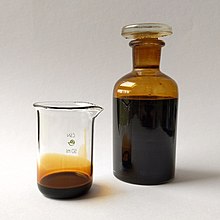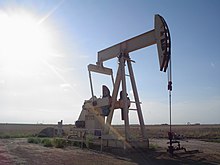Petroleum[a] is a naturally occurring yellowish-black liquid mixture. It consists mainly of hydrocarbons,[1] and is found in geological formations. The term petroleum refers both to naturally occurring unprocessed crude oil, as well as to petroleum products that consist of refined crude oil.
Conventional reserves of petroleum are primarily recovered by drilling, which is done after a study of the relevant structural geology, analysis of the sedimentary basin, and characterization of the petroleum reservoir. There are also unconventional reserves such as oil sands and oil shale which are recovered by other means such as fracking.
Once extracted, oil is refined and separated, most easily by distillation, into innumerable products for direct use or use in manufacturing. Products include fuels such as gasoline (petrol), diesel, kerosene and jet fuel; asphalt and lubricants; chemical reagents used to make plastics; solvents, textiles, refrigerants, paint, synthetic rubber, fertilizers, pesticides, pharmaceuticals, and thousands of others. Petroleum is used in manufacturing a vast variety of materials essential for modern life,[2] and it is estimated that the world consumes about 100 million barrels (16 million cubic metres) each day. Petroleum production played a key role in industrialization and economic development.[3] Some countries, known as petrostates, gained significant economic and international power over their control of oil production and trade.
Petroleum exploitation can be damaging to the environment and human health. Extraction, refining and burning of petroleum fuels all release large quantities of greenhouse gases, so petroleum is one of the major contributors to climate change. Other negative environmental effects include direct releases, such as oil spills, as well as air and water pollution at almost all stages of use. These environmental effects have direct and indirect health consequences for humans. Oil has also been a source of internal and inter-state conflict, leading to both state-led wars and other resource conflicts. Production of petroleum is estimated to reach peak oil before 2035[4] as global economies lower dependencies on petroleum as part of climate change mitigation and a transition towards renewable energy and electrification.[5]
Cite error: There are <ref group=lower-alpha> tags or {{efn}} templates on this page, but the references will not show without a {{reflist|group=lower-alpha}} template or {{notelist}} template (see the help page).
- ^ "EIA Energy Kids – Oil (petroleum)". www.eia.gov. Archived from the original on July 7, 2017. Retrieved March 18, 2018.
- ^ Krauss, Clifford; Mouawad, Jad (March 1, 2011). "Libyan tremors threaten to rattle the oil world". The Hindu. Chennai, India. Archived from the original on March 6, 2011.
- ^ "The Economic Benefits of Oil & Gas". Department of Energy. Archived from the original on March 31, 2024. Retrieved March 31, 2024.
- ^ Bullard, Nathaniel (December 9, 2021). "Peak Oil Demand Is Coming But Not So Soon". BNN, Bloomberg News. Retrieved December 11, 2021.
- ^ R, Tom; all; Warren, Hayley. "Peak Oil Is Already Here". Bloomberg.com. Archived from the original on December 18, 2020. Retrieved December 31, 2020.


